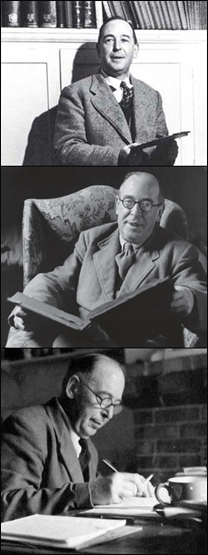
Fringe and CSL's The Abolition of Man
December 4th, 2008 | Skip to comments
Mark Boone of Baylor University’s doctoral philosophy program recently posted this intriguing reverie on the relationship between the themes of Jack’s The Abolition of Man and the FOX network serial, Fringe. (I am grateful to Michael Edwards for bringing this to my attention):
I began watching “Fringe” on Hulu last night, and I am definitely hooked. One heck of an alternative for a “LOST” fan in the off-season. Not a show for children or adults with disordered desires, what with some extramarital sex (at least the man involved had plans to marry the woman involved) and the gruesome shots of cruel medical experiments.
But let’s dispense with the pleasantries and get right down to philosophy. One of the show’s scriptwriters is a dead Oxford don named C. S. Lewis. You can still read one of the early scripts he wrote for the show; it was rejected because it didn’t have enough violence and the people talking about science weren’t sexy enough, but you can still find it in a nearby library under the title “The Abolition of Man.”
The show’s nemesis is a vast and coordinated conspiracy to change mankind using biotech. We’re not sure what they’re trying to change about us or why they’re doing it, but they’re out there—tinkering with our bodies, our brains, our genes. But the protagonist, Olivia Dunham, and her two friends are trying to protect the human beings that already exist.
The premise of the show is a familiar one. There are many different ways of saying it: Technology is “progressing” so quickly that we can’t keep up with it. Technology is “progressing” so quickly that we don’t have time to figure out what all the ethical implications are. Technology is “progressing” so quickly that we don’t usually have the chance to stop and think about what we’re going to do with it before it’s been done. Technology is “progressing” so quickly that before we know it we’re doing things with technology we shouldn’t do. Technology is moving so quickly that we can’t tell whether it is helping us progress or regress. A formulation derived from Chesterton: We are learning to do so many things that we’ve forgotten there are things we shouldn’t do, and we need to relearn them. Lastly, there is Lewis’ formulation: Man is so dazzled by his new technological powers that he may in short time abolish man.
Olivia and company are up against all the usual trappings: conspiracy, espionage, astounding technology, and not a few bad guys who carry guns. They have three tools at their disposal: very cooperative federal agencies (assuming no conspiracy in these agencies is revealed later; this is a distinct possibility), the unmatched scientific genius of Olivia’s two friends, and Olivia’s unmatched determination. In a telling scene she tells her superior: Yes, I am “emotional,” but I’m not going to apologize for it; it’s what makes me good at this job. Maybe I’m reading into things, but I interpret that as meaning that Miss Olivia Dunham has a desire to preserve human beings as they are; that she has more desire than arguments for this goal; and that she is ok with not having arguments for it, thank you very much.
I say, Hooray for Olivia Dunham! I have to think Lewis would agree with her.
Most of our philosophers are arguing over whether there is such a thing as human nature (and I say, Hooray for MacIntyre!). Meanwhile most of our scientists seem to have given up worrying about it, many of our pastors are busy making sure their congregations feel good about themselves, and our news media likes to stack the cards against nature because it makes for more sensational headlines—”Religion vs. Science!”, “Are Fundamentalists Impeding Progress?”, you know the stuff.
In straits like this who knew help would come from Hollywood? Thank God there are still artists out there expressing through their characters a primal revulsion at the effort to tinker with human nature in the name of Progress—and encouraging the audience to vicariously do the same. Think of “The Island,” “Serenity,” and now “Fringe.” Malcom Reynolds from “Serenity” got it right: Human nature is just fine the way it was, thank you very much.
Of course, things aren’t as bad in our world as they in Reynolds’ world, where the Alliance is explicit about wanting to correct human nature. In our society the rallying cry is usually “Quality of life!”—by which is generally meant more pleasure and less pain. No one stops to ask whether human life as such is not itself qualitatively more valuable than the pleasure it occasionally allows. In Olivia’s world, maybe “quality of life” is the motive behind the conspiracy. Or maybe the bad guys are more cynical than that; maybe they are just seeking power over the masses.
And maybe we will arrive at Reynolds’ world before long. Miss Olivia asks when things got this bad. I can’t answer that for her, but I can tell her where I think things may have first begun to go wrong. For critics of modernity it is all too easy to blame things on Descartes, but just the same I’m going to do that. The temptation to improve human nature has been part of modern science since its inception. We can use technology, says Descartes in the “Discourse on Method,” to master creation and our own bodies—not just to correct our ailments through technology, but to improve ourselves (see Part Six of the “Discourse,” Academy # 62).
This reckless attitude sets the agenda that Olivia Dunham is fighting against, a full four centuries later.
Here is my own earlier take on Joss Whedon’s Serenity, circa 2005, and the connections with Jack’s defense of humanity in The Abolition of Man.
We stand with Capt. Reynolds: “We aim to misbehave.”




Comments
No comments yet.
RSS feed for comments on this post.
Sorry, the comment form is closed at this time.